Evaluating Leadership Styles' Impact on Project Management Performance
VerifiedAdded on 2022/10/02
|13
|2371
|328
Thesis and Dissertation
AI Summary
This dissertation proposal investigates the influence of leadership styles on project management performance. The research aims to evaluate different leadership styles, analyze their impact, and assess the relationship between leadership and project management success. The proposal outlines the research questions, purpose, and scope, including limitations such as data accessibility and time constraints. An interpretivism philosophy and descriptive design will be used. Non-probability sampling will be used, and data will be collected through open-ended interviews. Qualitative data analysis will be used, and the research will maintain validity and reliability through peer-reviewed studies. A Gantt chart provides a timeline for the research process, from topic selection to final submission. The research seeks to provide recommendations for overcoming leadership challenges and improving project management performance.
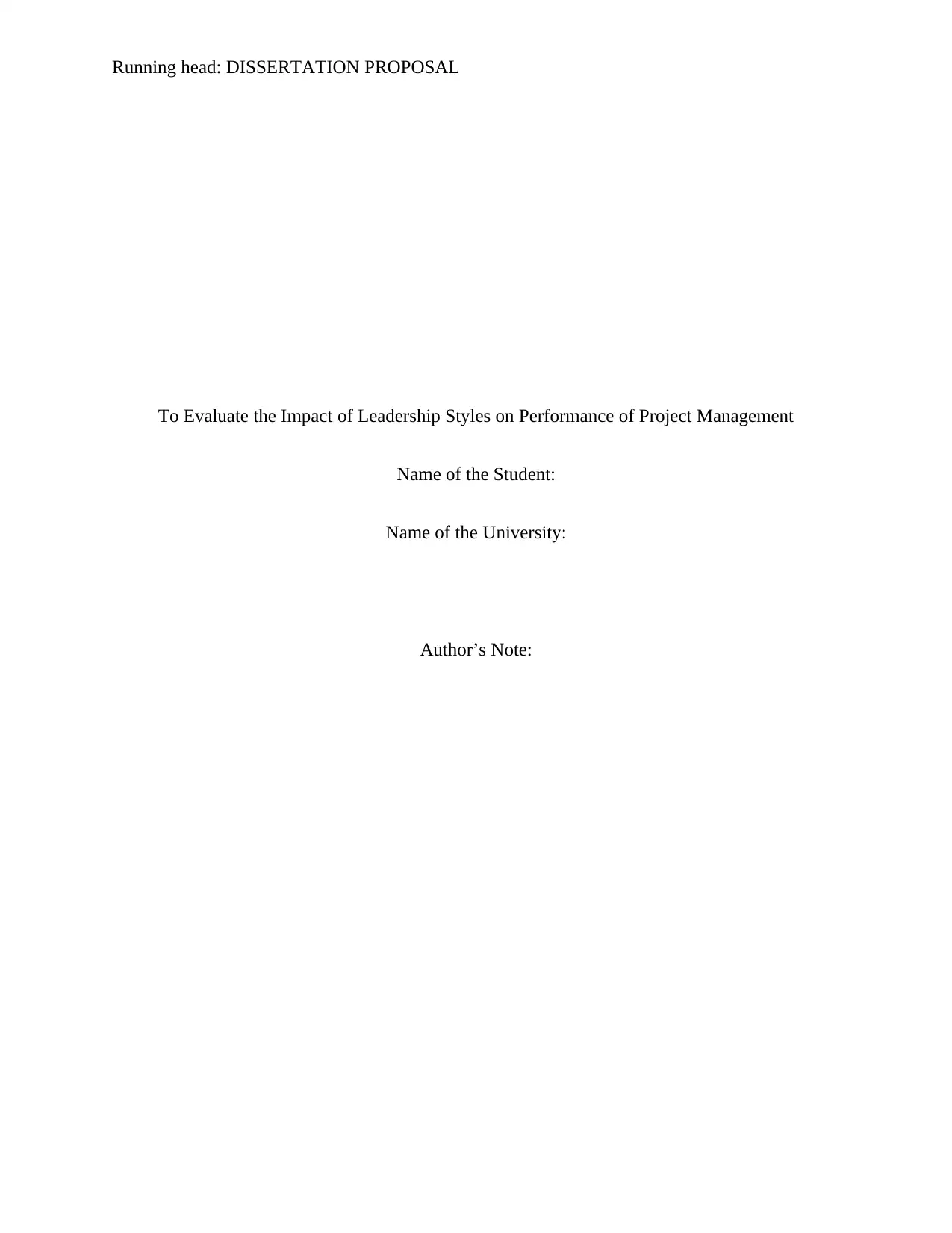
Running head: DISSERTATION PROPOSAL
To Evaluate the Impact of Leadership Styles on Performance of Project Management
Name of the Student:
Name of the University:
Author’s Note:
To Evaluate the Impact of Leadership Styles on Performance of Project Management
Name of the Student:
Name of the University:
Author’s Note:
Paraphrase This Document
Need a fresh take? Get an instant paraphrase of this document with our AI Paraphraser
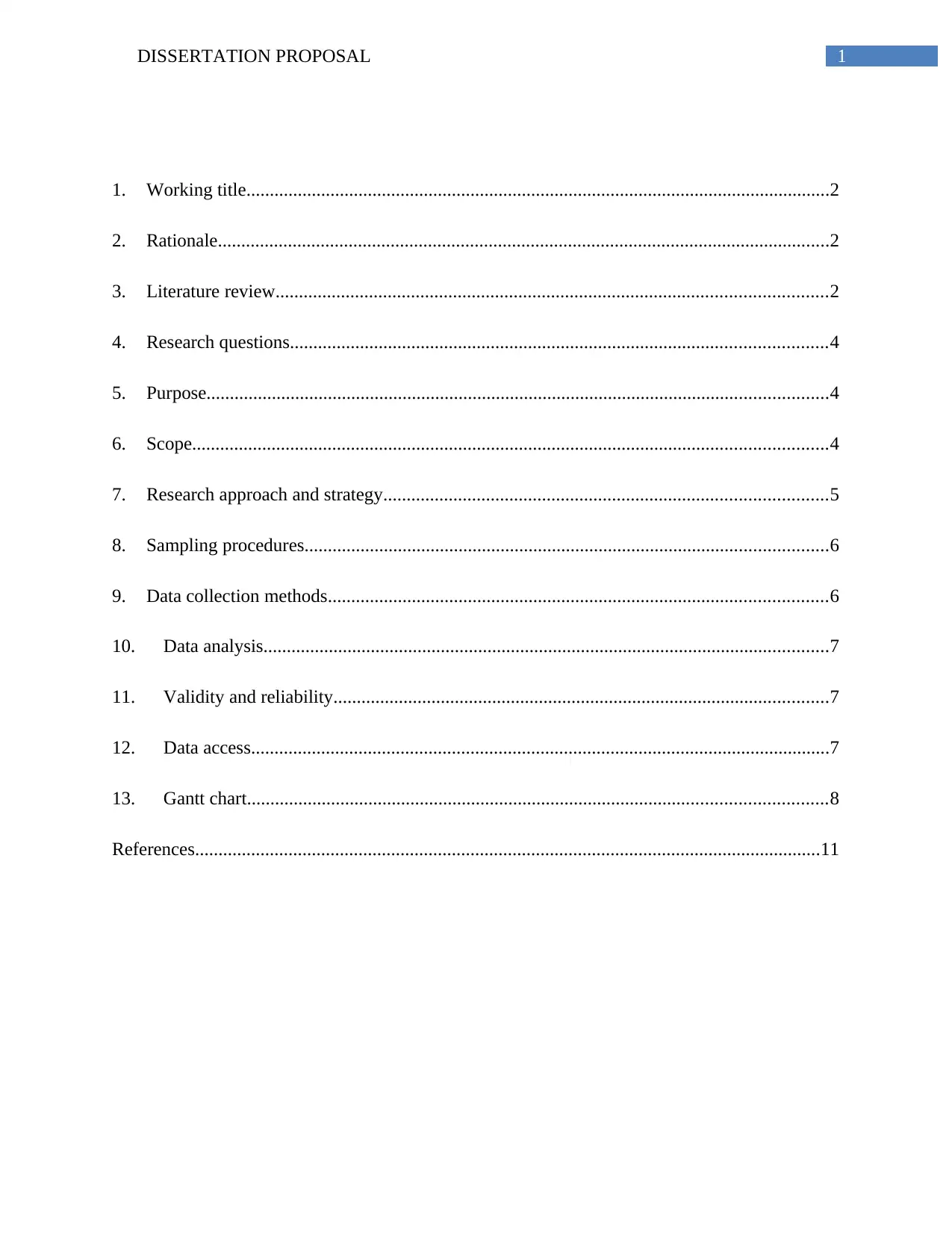
1DISSERTATION PROPOSAL
1. Working title.............................................................................................................................2
2. Rationale...................................................................................................................................2
3. Literature review......................................................................................................................2
4. Research questions...................................................................................................................4
5. Purpose.....................................................................................................................................4
6. Scope........................................................................................................................................4
7. Research approach and strategy...............................................................................................5
8. Sampling procedures................................................................................................................6
9. Data collection methods...........................................................................................................6
10. Data analysis.........................................................................................................................7
11. Validity and reliability..........................................................................................................7
12. Data access............................................................................................................................7
13. Gantt chart............................................................................................................................8
References......................................................................................................................................11
1. Working title.............................................................................................................................2
2. Rationale...................................................................................................................................2
3. Literature review......................................................................................................................2
4. Research questions...................................................................................................................4
5. Purpose.....................................................................................................................................4
6. Scope........................................................................................................................................4
7. Research approach and strategy...............................................................................................5
8. Sampling procedures................................................................................................................6
9. Data collection methods...........................................................................................................6
10. Data analysis.........................................................................................................................7
11. Validity and reliability..........................................................................................................7
12. Data access............................................................................................................................7
13. Gantt chart............................................................................................................................8
References......................................................................................................................................11
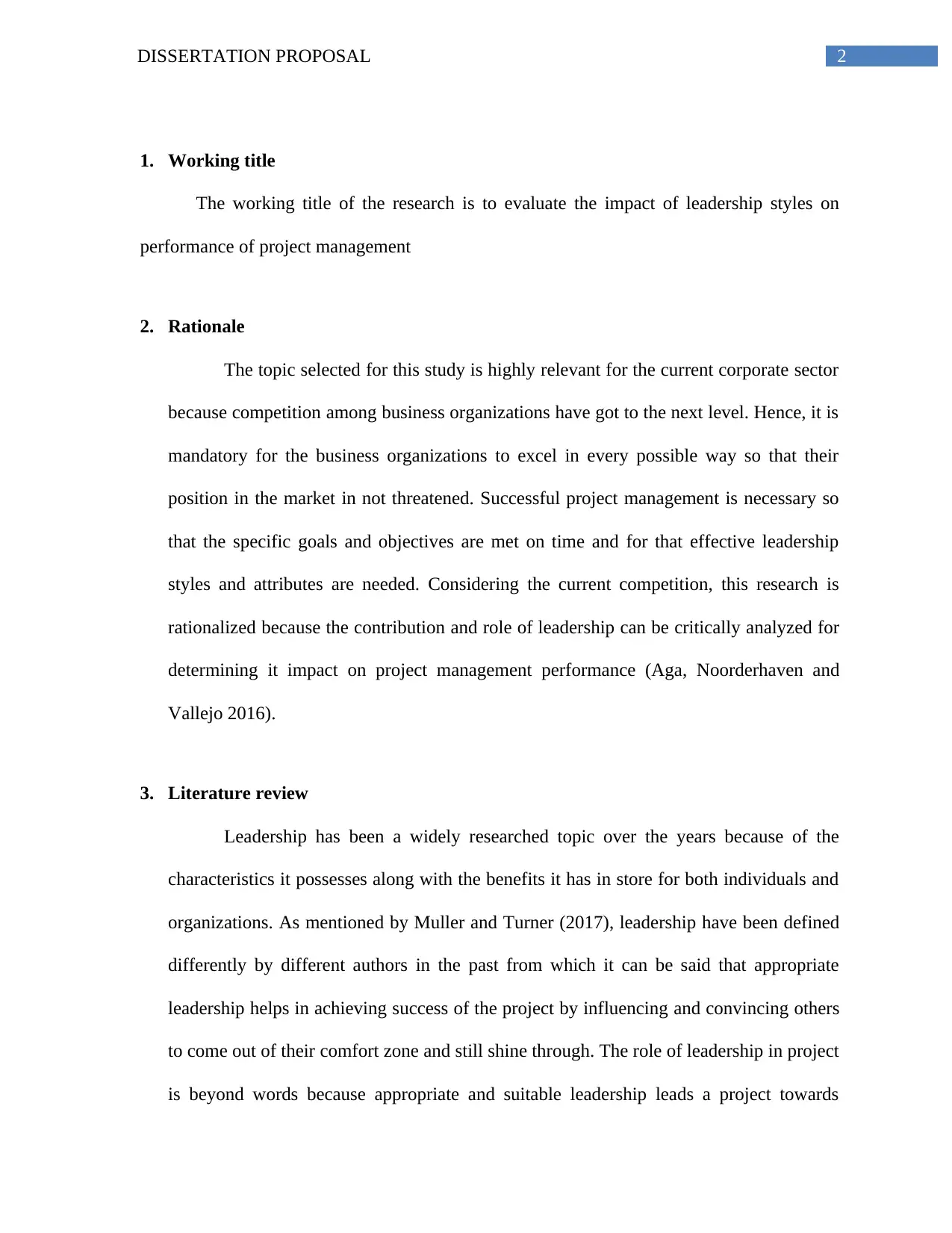
2DISSERTATION PROPOSAL
1. Working title
The working title of the research is to evaluate the impact of leadership styles on
performance of project management
2. Rationale
The topic selected for this study is highly relevant for the current corporate sector
because competition among business organizations have got to the next level. Hence, it is
mandatory for the business organizations to excel in every possible way so that their
position in the market in not threatened. Successful project management is necessary so
that the specific goals and objectives are met on time and for that effective leadership
styles and attributes are needed. Considering the current competition, this research is
rationalized because the contribution and role of leadership can be critically analyzed for
determining it impact on project management performance (Aga, Noorderhaven and
Vallejo 2016).
3. Literature review
Leadership has been a widely researched topic over the years because of the
characteristics it possesses along with the benefits it has in store for both individuals and
organizations. As mentioned by Muller and Turner (2017), leadership have been defined
differently by different authors in the past from which it can be said that appropriate
leadership helps in achieving success of the project by influencing and convincing others
to come out of their comfort zone and still shine through. The role of leadership in project
is beyond words because appropriate and suitable leadership leads a project towards
1. Working title
The working title of the research is to evaluate the impact of leadership styles on
performance of project management
2. Rationale
The topic selected for this study is highly relevant for the current corporate sector
because competition among business organizations have got to the next level. Hence, it is
mandatory for the business organizations to excel in every possible way so that their
position in the market in not threatened. Successful project management is necessary so
that the specific goals and objectives are met on time and for that effective leadership
styles and attributes are needed. Considering the current competition, this research is
rationalized because the contribution and role of leadership can be critically analyzed for
determining it impact on project management performance (Aga, Noorderhaven and
Vallejo 2016).
3. Literature review
Leadership has been a widely researched topic over the years because of the
characteristics it possesses along with the benefits it has in store for both individuals and
organizations. As mentioned by Muller and Turner (2017), leadership have been defined
differently by different authors in the past from which it can be said that appropriate
leadership helps in achieving success of the project by influencing and convincing others
to come out of their comfort zone and still shine through. The role of leadership in project
is beyond words because appropriate and suitable leadership leads a project towards
⊘ This is a preview!⊘
Do you want full access?
Subscribe today to unlock all pages.

Trusted by 1+ million students worldwide
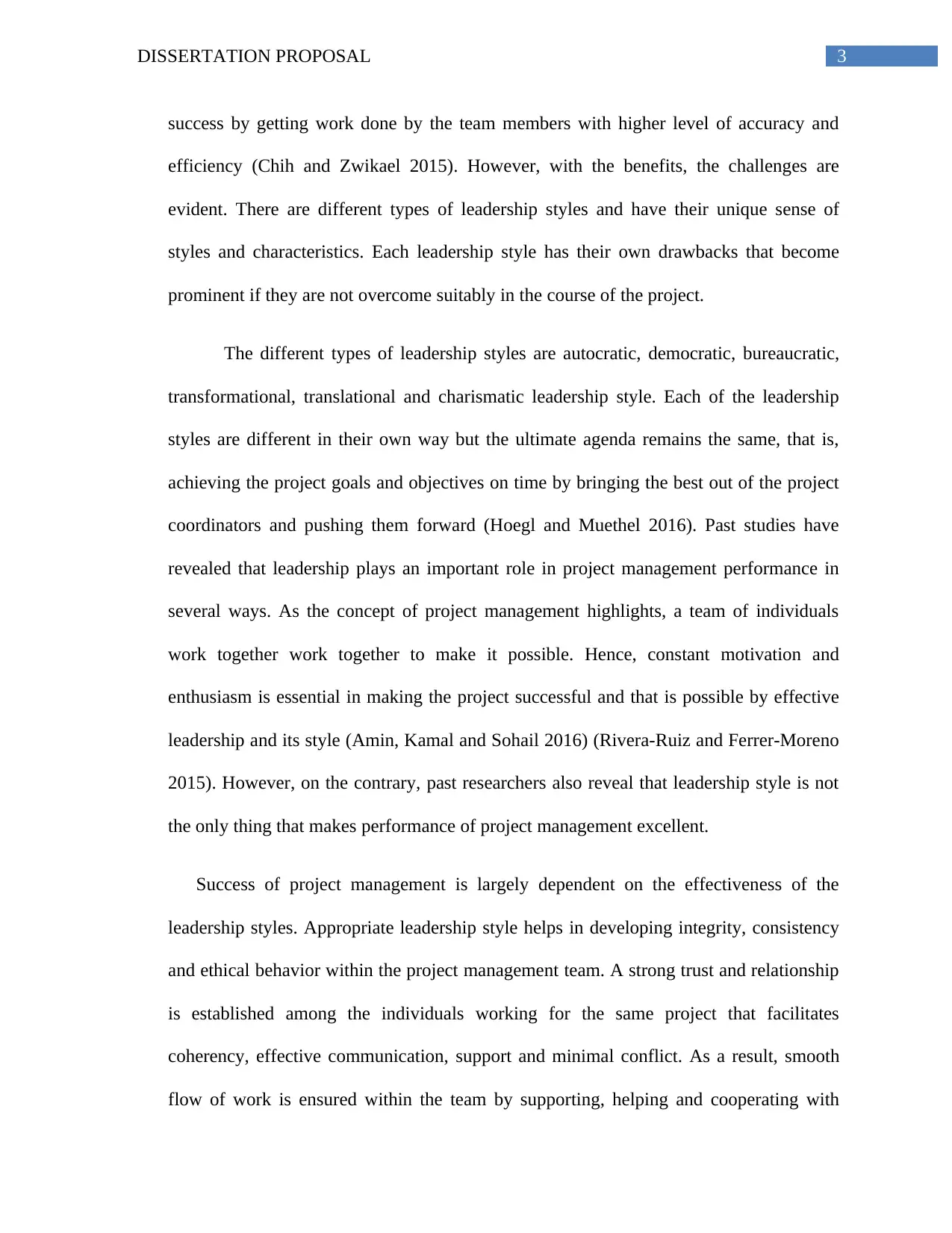
3DISSERTATION PROPOSAL
success by getting work done by the team members with higher level of accuracy and
efficiency (Chih and Zwikael 2015). However, with the benefits, the challenges are
evident. There are different types of leadership styles and have their unique sense of
styles and characteristics. Each leadership style has their own drawbacks that become
prominent if they are not overcome suitably in the course of the project.
The different types of leadership styles are autocratic, democratic, bureaucratic,
transformational, translational and charismatic leadership style. Each of the leadership
styles are different in their own way but the ultimate agenda remains the same, that is,
achieving the project goals and objectives on time by bringing the best out of the project
coordinators and pushing them forward (Hoegl and Muethel 2016). Past studies have
revealed that leadership plays an important role in project management performance in
several ways. As the concept of project management highlights, a team of individuals
work together work together to make it possible. Hence, constant motivation and
enthusiasm is essential in making the project successful and that is possible by effective
leadership and its style (Amin, Kamal and Sohail 2016) (Rivera-Ruiz and Ferrer-Moreno
2015). However, on the contrary, past researchers also reveal that leadership style is not
the only thing that makes performance of project management excellent.
Success of project management is largely dependent on the effectiveness of the
leadership styles. Appropriate leadership style helps in developing integrity, consistency
and ethical behavior within the project management team. A strong trust and relationship
is established among the individuals working for the same project that facilitates
coherency, effective communication, support and minimal conflict. As a result, smooth
flow of work is ensured within the team by supporting, helping and cooperating with
success by getting work done by the team members with higher level of accuracy and
efficiency (Chih and Zwikael 2015). However, with the benefits, the challenges are
evident. There are different types of leadership styles and have their unique sense of
styles and characteristics. Each leadership style has their own drawbacks that become
prominent if they are not overcome suitably in the course of the project.
The different types of leadership styles are autocratic, democratic, bureaucratic,
transformational, translational and charismatic leadership style. Each of the leadership
styles are different in their own way but the ultimate agenda remains the same, that is,
achieving the project goals and objectives on time by bringing the best out of the project
coordinators and pushing them forward (Hoegl and Muethel 2016). Past studies have
revealed that leadership plays an important role in project management performance in
several ways. As the concept of project management highlights, a team of individuals
work together work together to make it possible. Hence, constant motivation and
enthusiasm is essential in making the project successful and that is possible by effective
leadership and its style (Amin, Kamal and Sohail 2016) (Rivera-Ruiz and Ferrer-Moreno
2015). However, on the contrary, past researchers also reveal that leadership style is not
the only thing that makes performance of project management excellent.
Success of project management is largely dependent on the effectiveness of the
leadership styles. Appropriate leadership style helps in developing integrity, consistency
and ethical behavior within the project management team. A strong trust and relationship
is established among the individuals working for the same project that facilitates
coherency, effective communication, support and minimal conflict. As a result, smooth
flow of work is ensured within the team by supporting, helping and cooperating with
Paraphrase This Document
Need a fresh take? Get an instant paraphrase of this document with our AI Paraphraser

4DISSERTATION PROPOSAL
each other thereby, ensuring improved project management performance. Appropriate
leadership styles help the individuals to have clarity that facilitates preparation and
planning and overcoming individual obstacles those arises repeatedly and motivating
them to move forward without stopping (Zhao, Hwang and Lee 2016).
4. Research questions
The question of the research is:
Do leadership styles have an impact on the performance of project management?
5. Purpose
The purposes of the research are listed below:
To investigate the different types of leadership styles
To critically analyze the impact of leadership styles on the performance of project
management
To assess the relationship between leadership styles and improved project
management performances
To identify the leadership challenges that occurs in ensuring project management
performance
To provide suitable recommendations for improving project management
performance by overcoming leadership challenges
each other thereby, ensuring improved project management performance. Appropriate
leadership styles help the individuals to have clarity that facilitates preparation and
planning and overcoming individual obstacles those arises repeatedly and motivating
them to move forward without stopping (Zhao, Hwang and Lee 2016).
4. Research questions
The question of the research is:
Do leadership styles have an impact on the performance of project management?
5. Purpose
The purposes of the research are listed below:
To investigate the different types of leadership styles
To critically analyze the impact of leadership styles on the performance of project
management
To assess the relationship between leadership styles and improved project
management performances
To identify the leadership challenges that occurs in ensuring project management
performance
To provide suitable recommendations for improving project management
performance by overcoming leadership challenges
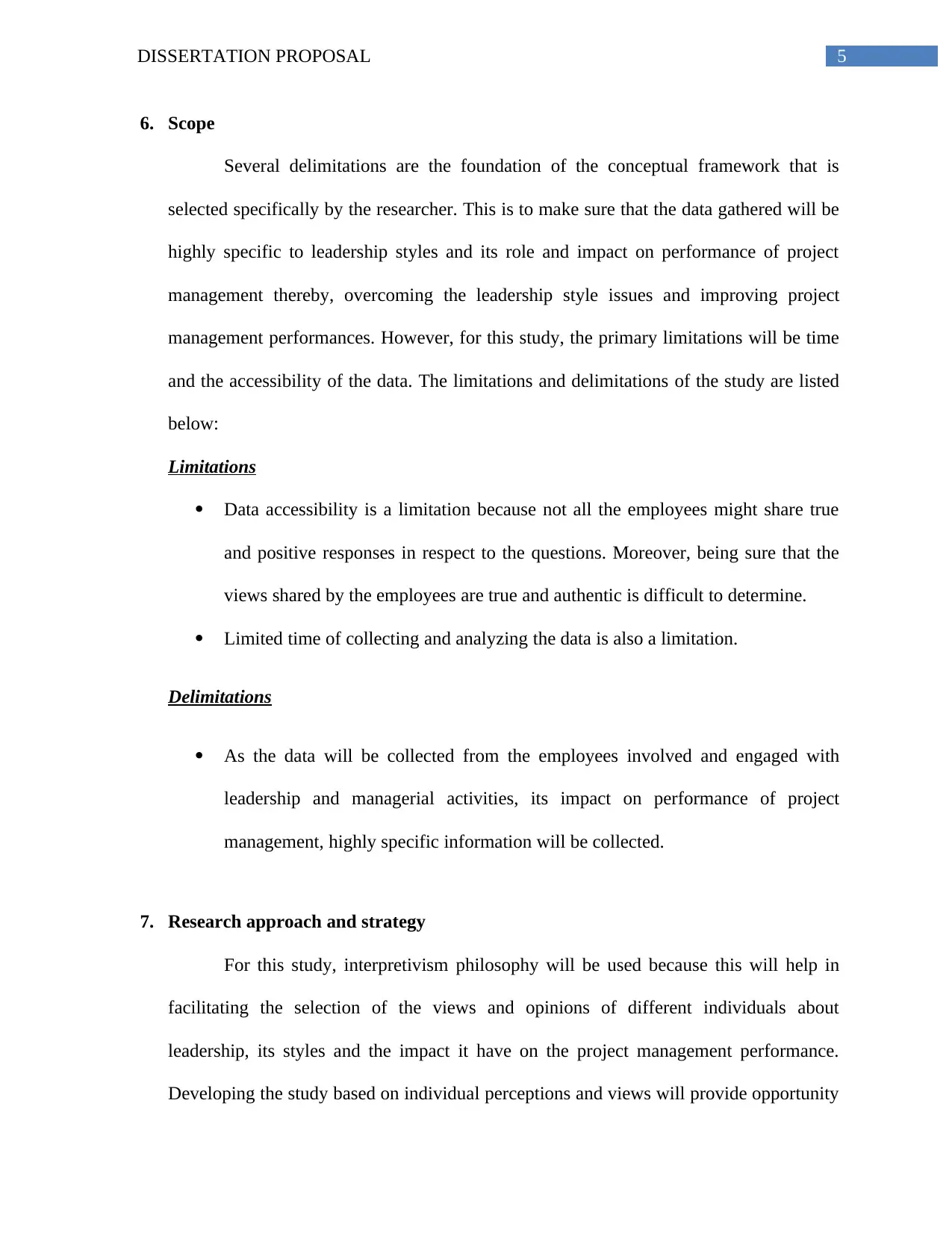
5DISSERTATION PROPOSAL
6. Scope
Several delimitations are the foundation of the conceptual framework that is
selected specifically by the researcher. This is to make sure that the data gathered will be
highly specific to leadership styles and its role and impact on performance of project
management thereby, overcoming the leadership style issues and improving project
management performances. However, for this study, the primary limitations will be time
and the accessibility of the data. The limitations and delimitations of the study are listed
below:
Limitations
Data accessibility is a limitation because not all the employees might share true
and positive responses in respect to the questions. Moreover, being sure that the
views shared by the employees are true and authentic is difficult to determine.
Limited time of collecting and analyzing the data is also a limitation.
Delimitations
As the data will be collected from the employees involved and engaged with
leadership and managerial activities, its impact on performance of project
management, highly specific information will be collected.
7. Research approach and strategy
For this study, interpretivism philosophy will be used because this will help in
facilitating the selection of the views and opinions of different individuals about
leadership, its styles and the impact it have on the project management performance.
Developing the study based on individual perceptions and views will provide opportunity
6. Scope
Several delimitations are the foundation of the conceptual framework that is
selected specifically by the researcher. This is to make sure that the data gathered will be
highly specific to leadership styles and its role and impact on performance of project
management thereby, overcoming the leadership style issues and improving project
management performances. However, for this study, the primary limitations will be time
and the accessibility of the data. The limitations and delimitations of the study are listed
below:
Limitations
Data accessibility is a limitation because not all the employees might share true
and positive responses in respect to the questions. Moreover, being sure that the
views shared by the employees are true and authentic is difficult to determine.
Limited time of collecting and analyzing the data is also a limitation.
Delimitations
As the data will be collected from the employees involved and engaged with
leadership and managerial activities, its impact on performance of project
management, highly specific information will be collected.
7. Research approach and strategy
For this study, interpretivism philosophy will be used because this will help in
facilitating the selection of the views and opinions of different individuals about
leadership, its styles and the impact it have on the project management performance.
Developing the study based on individual perceptions and views will provide opportunity
⊘ This is a preview!⊘
Do you want full access?
Subscribe today to unlock all pages.

Trusted by 1+ million students worldwide
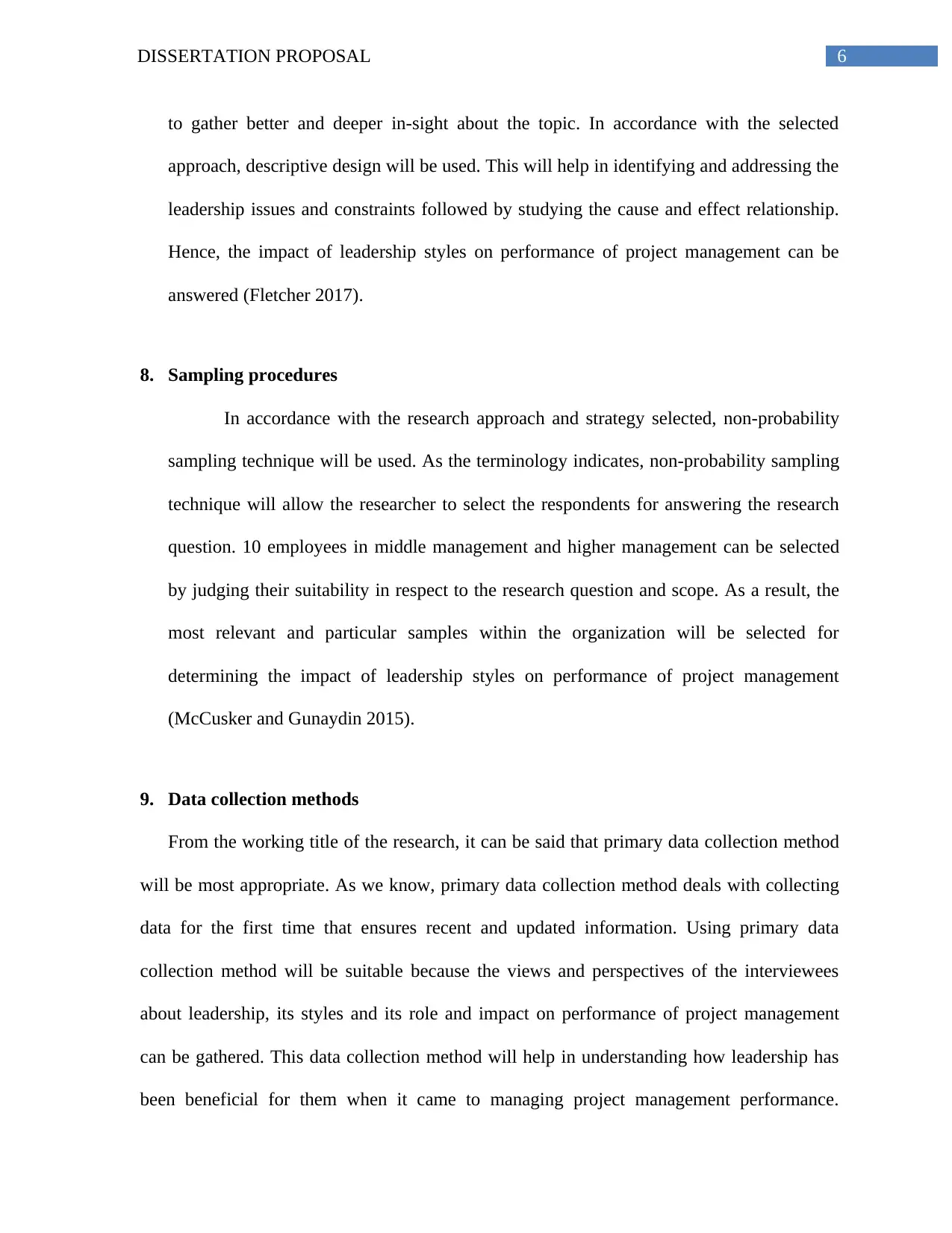
6DISSERTATION PROPOSAL
to gather better and deeper in-sight about the topic. In accordance with the selected
approach, descriptive design will be used. This will help in identifying and addressing the
leadership issues and constraints followed by studying the cause and effect relationship.
Hence, the impact of leadership styles on performance of project management can be
answered (Fletcher 2017).
8. Sampling procedures
In accordance with the research approach and strategy selected, non-probability
sampling technique will be used. As the terminology indicates, non-probability sampling
technique will allow the researcher to select the respondents for answering the research
question. 10 employees in middle management and higher management can be selected
by judging their suitability in respect to the research question and scope. As a result, the
most relevant and particular samples within the organization will be selected for
determining the impact of leadership styles on performance of project management
(McCusker and Gunaydin 2015).
9. Data collection methods
From the working title of the research, it can be said that primary data collection method
will be most appropriate. As we know, primary data collection method deals with collecting
data for the first time that ensures recent and updated information. Using primary data
collection method will be suitable because the views and perspectives of the interviewees
about leadership, its styles and its role and impact on performance of project management
can be gathered. This data collection method will help in understanding how leadership has
been beneficial for them when it came to managing project management performance.
to gather better and deeper in-sight about the topic. In accordance with the selected
approach, descriptive design will be used. This will help in identifying and addressing the
leadership issues and constraints followed by studying the cause and effect relationship.
Hence, the impact of leadership styles on performance of project management can be
answered (Fletcher 2017).
8. Sampling procedures
In accordance with the research approach and strategy selected, non-probability
sampling technique will be used. As the terminology indicates, non-probability sampling
technique will allow the researcher to select the respondents for answering the research
question. 10 employees in middle management and higher management can be selected
by judging their suitability in respect to the research question and scope. As a result, the
most relevant and particular samples within the organization will be selected for
determining the impact of leadership styles on performance of project management
(McCusker and Gunaydin 2015).
9. Data collection methods
From the working title of the research, it can be said that primary data collection method
will be most appropriate. As we know, primary data collection method deals with collecting
data for the first time that ensures recent and updated information. Using primary data
collection method will be suitable because the views and perspectives of the interviewees
about leadership, its styles and its role and impact on performance of project management
can be gathered. This data collection method will help in understanding how leadership has
been beneficial for them when it came to managing project management performance.
Paraphrase This Document
Need a fresh take? Get an instant paraphrase of this document with our AI Paraphraser
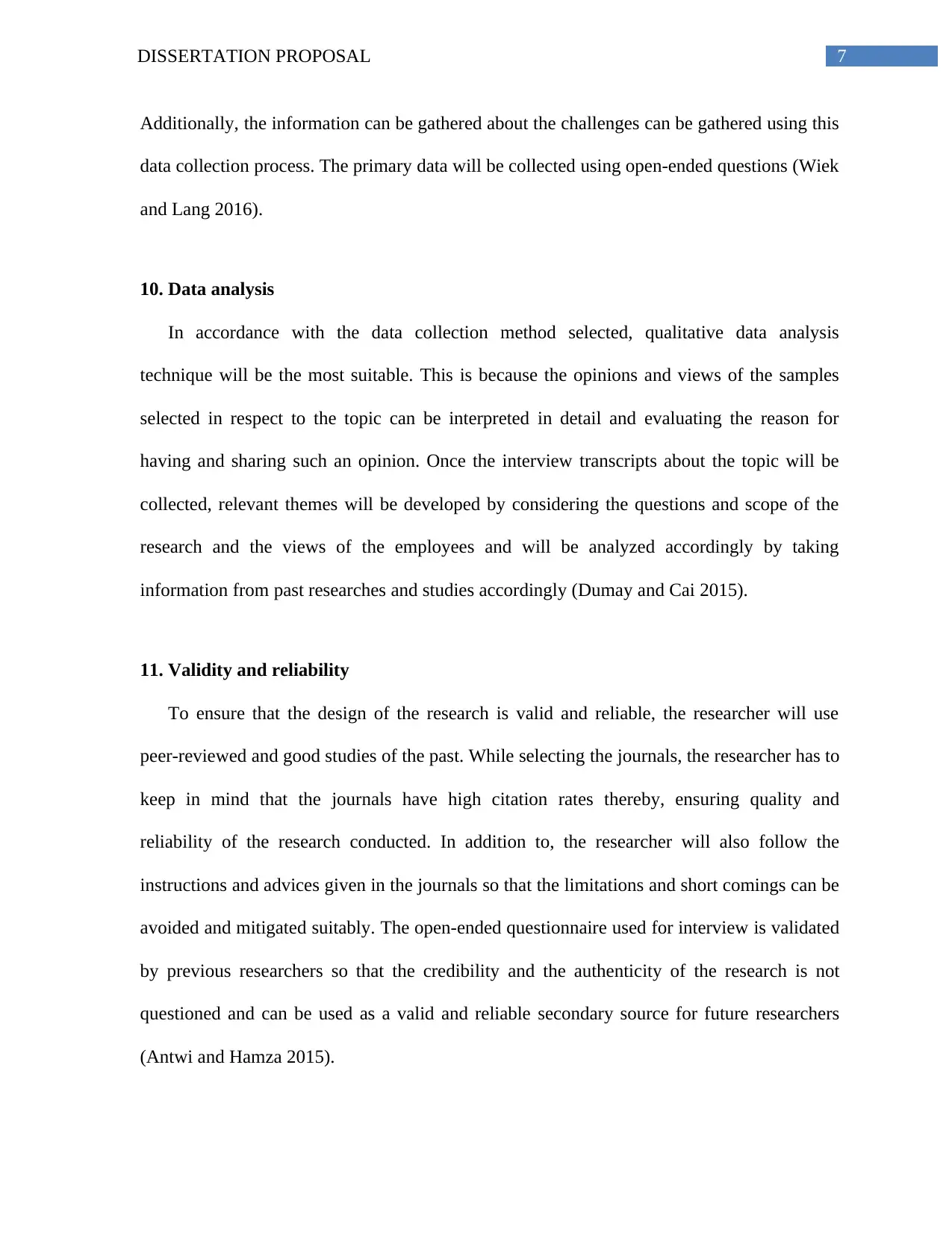
7DISSERTATION PROPOSAL
Additionally, the information can be gathered about the challenges can be gathered using this
data collection process. The primary data will be collected using open-ended questions (Wiek
and Lang 2016).
10. Data analysis
In accordance with the data collection method selected, qualitative data analysis
technique will be the most suitable. This is because the opinions and views of the samples
selected in respect to the topic can be interpreted in detail and evaluating the reason for
having and sharing such an opinion. Once the interview transcripts about the topic will be
collected, relevant themes will be developed by considering the questions and scope of the
research and the views of the employees and will be analyzed accordingly by taking
information from past researches and studies accordingly (Dumay and Cai 2015).
11. Validity and reliability
To ensure that the design of the research is valid and reliable, the researcher will use
peer-reviewed and good studies of the past. While selecting the journals, the researcher has to
keep in mind that the journals have high citation rates thereby, ensuring quality and
reliability of the research conducted. In addition to, the researcher will also follow the
instructions and advices given in the journals so that the limitations and short comings can be
avoided and mitigated suitably. The open-ended questionnaire used for interview is validated
by previous researchers so that the credibility and the authenticity of the research is not
questioned and can be used as a valid and reliable secondary source for future researchers
(Antwi and Hamza 2015).
Additionally, the information can be gathered about the challenges can be gathered using this
data collection process. The primary data will be collected using open-ended questions (Wiek
and Lang 2016).
10. Data analysis
In accordance with the data collection method selected, qualitative data analysis
technique will be the most suitable. This is because the opinions and views of the samples
selected in respect to the topic can be interpreted in detail and evaluating the reason for
having and sharing such an opinion. Once the interview transcripts about the topic will be
collected, relevant themes will be developed by considering the questions and scope of the
research and the views of the employees and will be analyzed accordingly by taking
information from past researches and studies accordingly (Dumay and Cai 2015).
11. Validity and reliability
To ensure that the design of the research is valid and reliable, the researcher will use
peer-reviewed and good studies of the past. While selecting the journals, the researcher has to
keep in mind that the journals have high citation rates thereby, ensuring quality and
reliability of the research conducted. In addition to, the researcher will also follow the
instructions and advices given in the journals so that the limitations and short comings can be
avoided and mitigated suitably. The open-ended questionnaire used for interview is validated
by previous researchers so that the credibility and the authenticity of the research is not
questioned and can be used as a valid and reliable secondary source for future researchers
(Antwi and Hamza 2015).
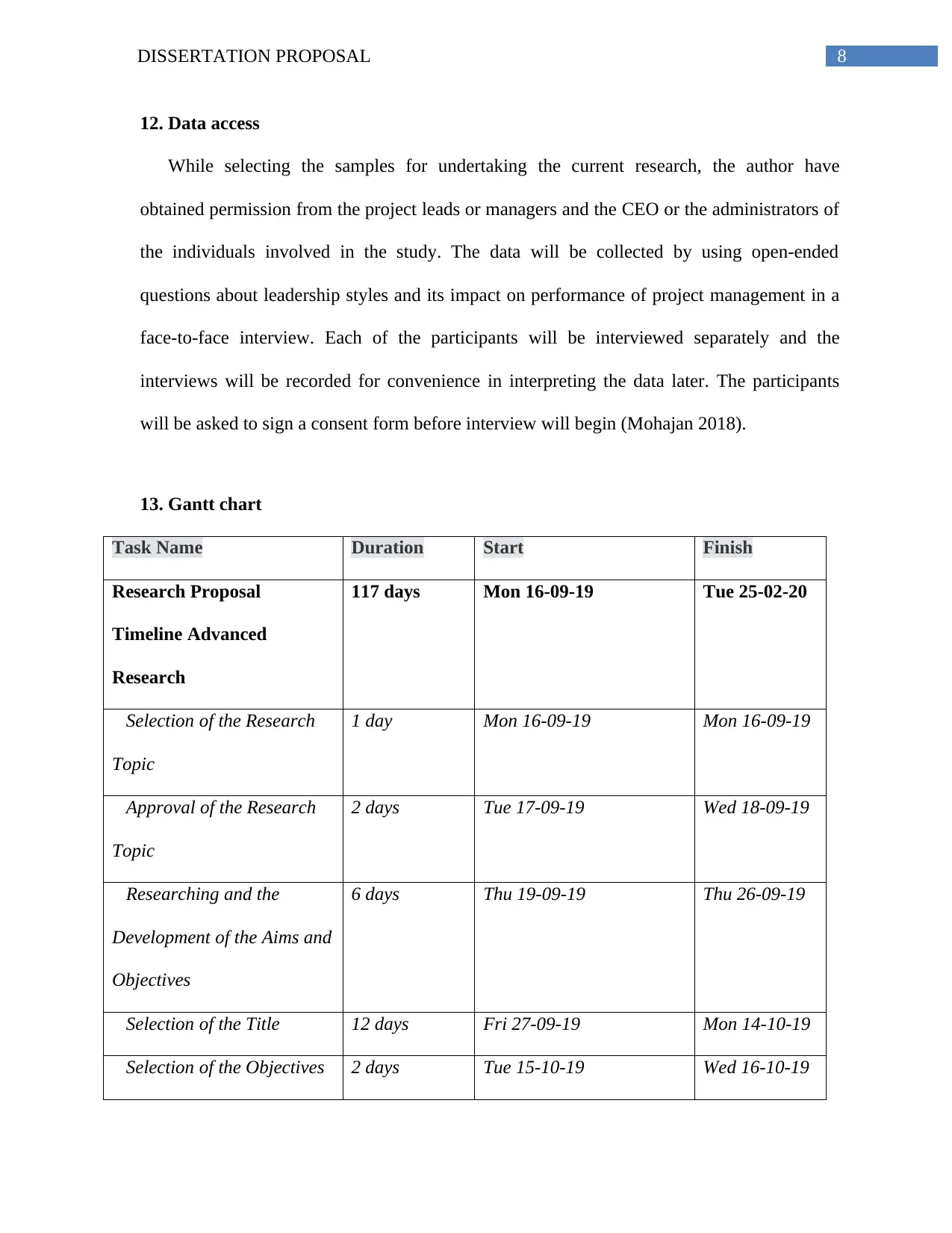
8DISSERTATION PROPOSAL
12. Data access
While selecting the samples for undertaking the current research, the author have
obtained permission from the project leads or managers and the CEO or the administrators of
the individuals involved in the study. The data will be collected by using open-ended
questions about leadership styles and its impact on performance of project management in a
face-to-face interview. Each of the participants will be interviewed separately and the
interviews will be recorded for convenience in interpreting the data later. The participants
will be asked to sign a consent form before interview will begin (Mohajan 2018).
13. Gantt chart
Task Name Duration Start Finish
Research Proposal
Timeline Advanced
Research
117 days Mon 16-09-19 Tue 25-02-20
Selection of the Research
Topic
1 day Mon 16-09-19 Mon 16-09-19
Approval of the Research
Topic
2 days Tue 17-09-19 Wed 18-09-19
Researching and the
Development of the Aims and
Objectives
6 days Thu 19-09-19 Thu 26-09-19
Selection of the Title 12 days Fri 27-09-19 Mon 14-10-19
Selection of the Objectives 2 days Tue 15-10-19 Wed 16-10-19
12. Data access
While selecting the samples for undertaking the current research, the author have
obtained permission from the project leads or managers and the CEO or the administrators of
the individuals involved in the study. The data will be collected by using open-ended
questions about leadership styles and its impact on performance of project management in a
face-to-face interview. Each of the participants will be interviewed separately and the
interviews will be recorded for convenience in interpreting the data later. The participants
will be asked to sign a consent form before interview will begin (Mohajan 2018).
13. Gantt chart
Task Name Duration Start Finish
Research Proposal
Timeline Advanced
Research
117 days Mon 16-09-19 Tue 25-02-20
Selection of the Research
Topic
1 day Mon 16-09-19 Mon 16-09-19
Approval of the Research
Topic
2 days Tue 17-09-19 Wed 18-09-19
Researching and the
Development of the Aims and
Objectives
6 days Thu 19-09-19 Thu 26-09-19
Selection of the Title 12 days Fri 27-09-19 Mon 14-10-19
Selection of the Objectives 2 days Tue 15-10-19 Wed 16-10-19
⊘ This is a preview!⊘
Do you want full access?
Subscribe today to unlock all pages.

Trusted by 1+ million students worldwide
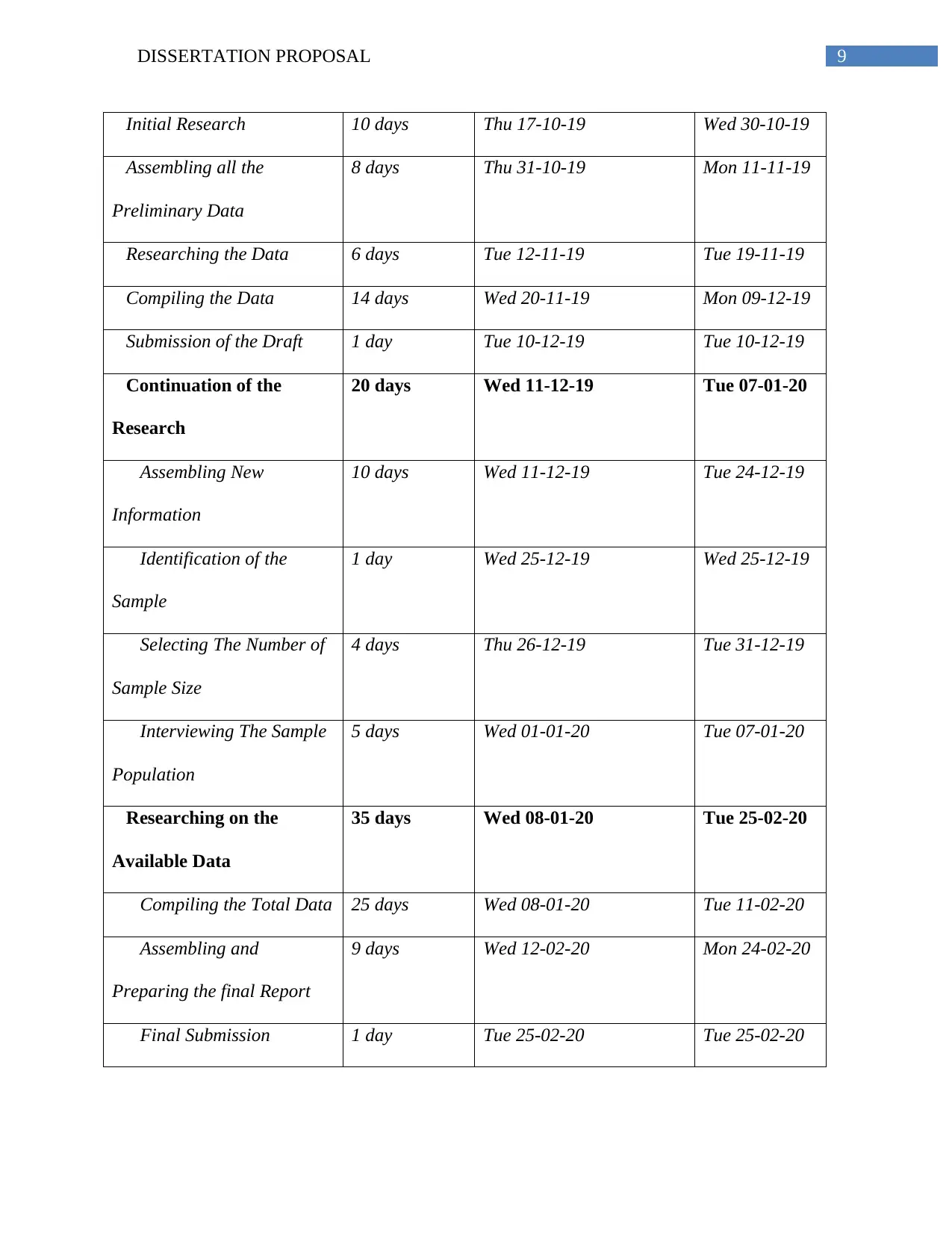
9DISSERTATION PROPOSAL
Initial Research 10 days Thu 17-10-19 Wed 30-10-19
Assembling all the
Preliminary Data
8 days Thu 31-10-19 Mon 11-11-19
Researching the Data 6 days Tue 12-11-19 Tue 19-11-19
Compiling the Data 14 days Wed 20-11-19 Mon 09-12-19
Submission of the Draft 1 day Tue 10-12-19 Tue 10-12-19
Continuation of the
Research
20 days Wed 11-12-19 Tue 07-01-20
Assembling New
Information
10 days Wed 11-12-19 Tue 24-12-19
Identification of the
Sample
1 day Wed 25-12-19 Wed 25-12-19
Selecting The Number of
Sample Size
4 days Thu 26-12-19 Tue 31-12-19
Interviewing The Sample
Population
5 days Wed 01-01-20 Tue 07-01-20
Researching on the
Available Data
35 days Wed 08-01-20 Tue 25-02-20
Compiling the Total Data 25 days Wed 08-01-20 Tue 11-02-20
Assembling and
Preparing the final Report
9 days Wed 12-02-20 Mon 24-02-20
Final Submission 1 day Tue 25-02-20 Tue 25-02-20
Initial Research 10 days Thu 17-10-19 Wed 30-10-19
Assembling all the
Preliminary Data
8 days Thu 31-10-19 Mon 11-11-19
Researching the Data 6 days Tue 12-11-19 Tue 19-11-19
Compiling the Data 14 days Wed 20-11-19 Mon 09-12-19
Submission of the Draft 1 day Tue 10-12-19 Tue 10-12-19
Continuation of the
Research
20 days Wed 11-12-19 Tue 07-01-20
Assembling New
Information
10 days Wed 11-12-19 Tue 24-12-19
Identification of the
Sample
1 day Wed 25-12-19 Wed 25-12-19
Selecting The Number of
Sample Size
4 days Thu 26-12-19 Tue 31-12-19
Interviewing The Sample
Population
5 days Wed 01-01-20 Tue 07-01-20
Researching on the
Available Data
35 days Wed 08-01-20 Tue 25-02-20
Compiling the Total Data 25 days Wed 08-01-20 Tue 11-02-20
Assembling and
Preparing the final Report
9 days Wed 12-02-20 Mon 24-02-20
Final Submission 1 day Tue 25-02-20 Tue 25-02-20
Paraphrase This Document
Need a fresh take? Get an instant paraphrase of this document with our AI Paraphraser
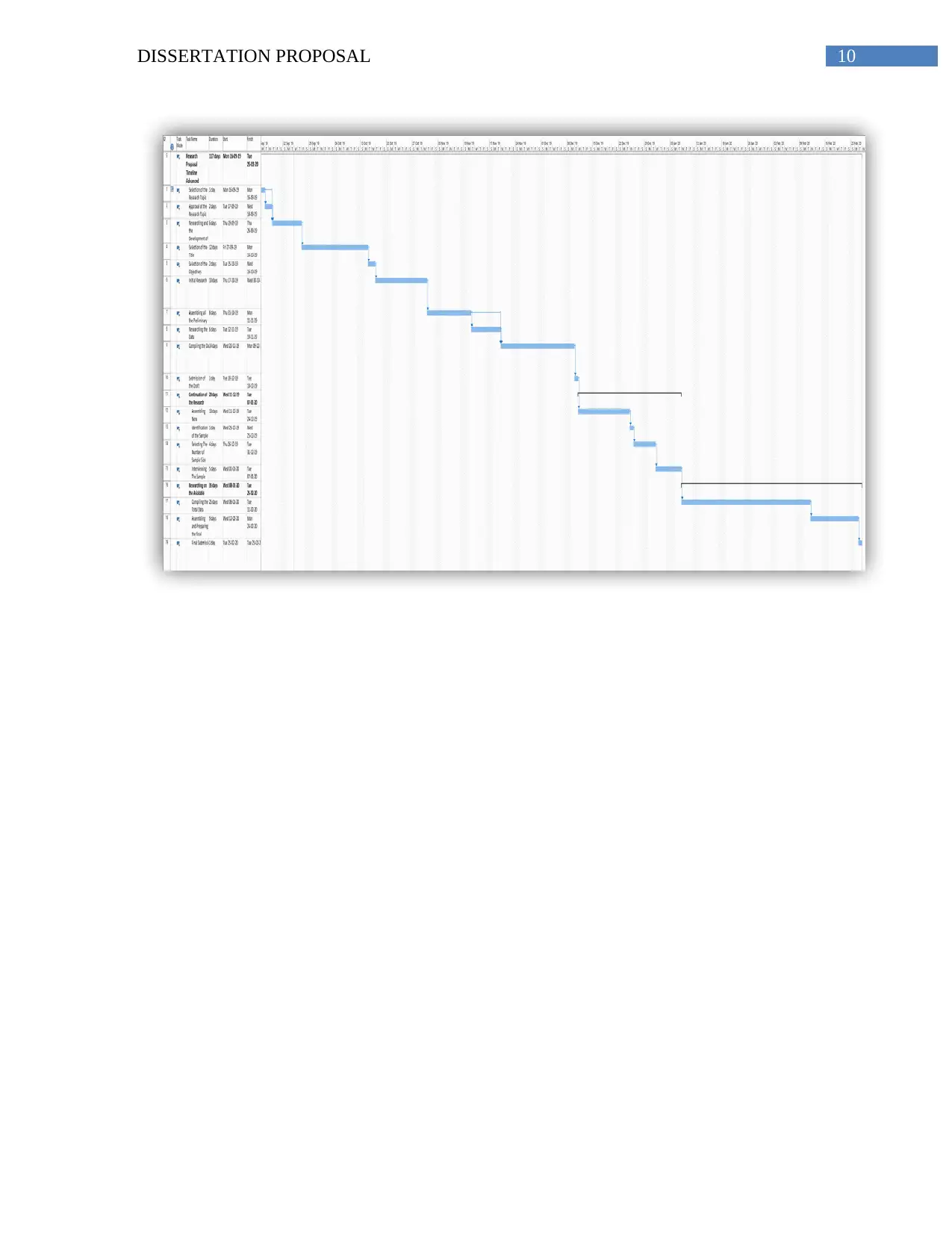
10DISSERTATION PROPOSAL
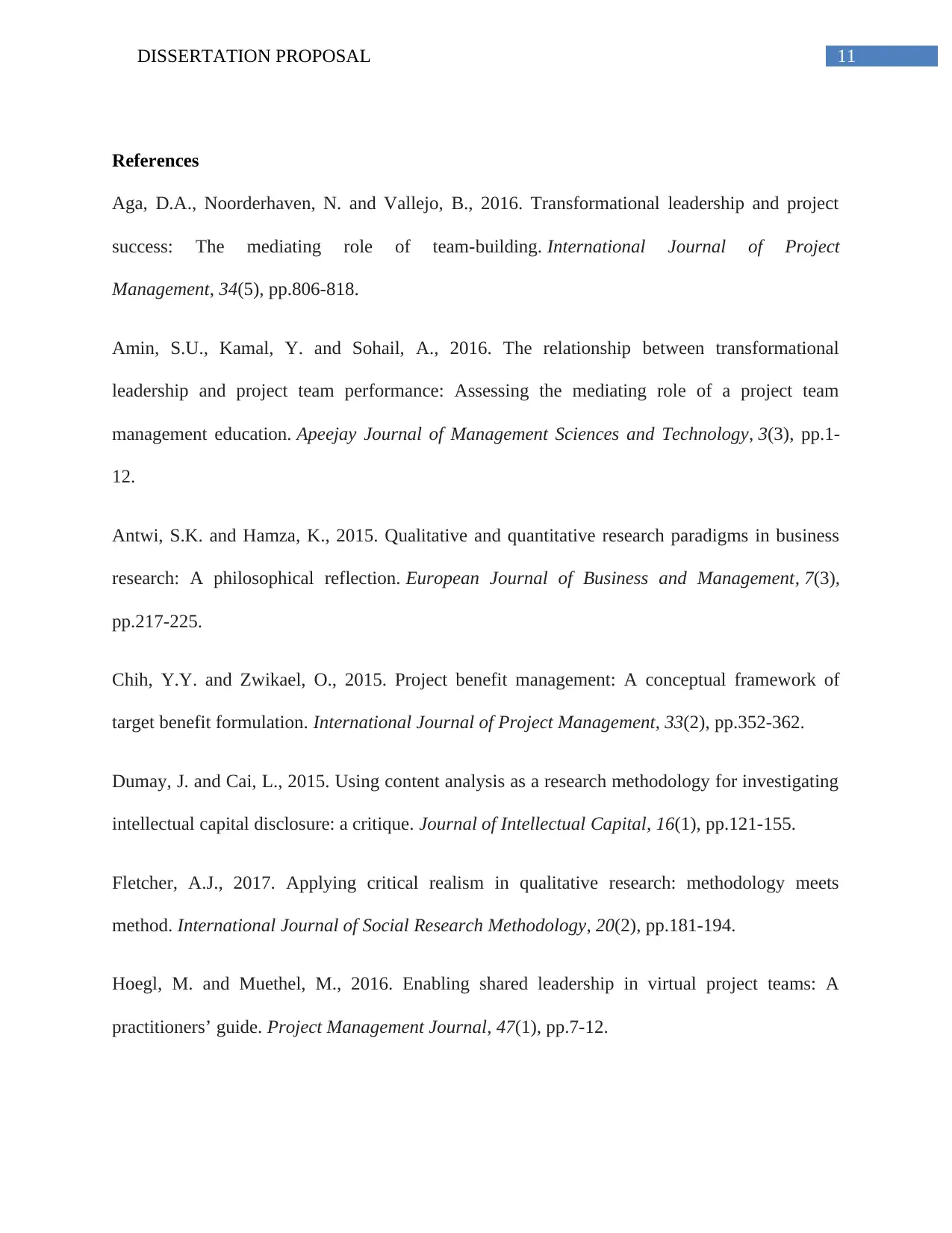
11DISSERTATION PROPOSAL
References
Aga, D.A., Noorderhaven, N. and Vallejo, B., 2016. Transformational leadership and project
success: The mediating role of team-building. International Journal of Project
Management, 34(5), pp.806-818.
Amin, S.U., Kamal, Y. and Sohail, A., 2016. The relationship between transformational
leadership and project team performance: Assessing the mediating role of a project team
management education. Apeejay Journal of Management Sciences and Technology, 3(3), pp.1-
12.
Antwi, S.K. and Hamza, K., 2015. Qualitative and quantitative research paradigms in business
research: A philosophical reflection. European Journal of Business and Management, 7(3),
pp.217-225.
Chih, Y.Y. and Zwikael, O., 2015. Project benefit management: A conceptual framework of
target benefit formulation. International Journal of Project Management, 33(2), pp.352-362.
Dumay, J. and Cai, L., 2015. Using content analysis as a research methodology for investigating
intellectual capital disclosure: a critique. Journal of Intellectual Capital, 16(1), pp.121-155.
Fletcher, A.J., 2017. Applying critical realism in qualitative research: methodology meets
method. International Journal of Social Research Methodology, 20(2), pp.181-194.
Hoegl, M. and Muethel, M., 2016. Enabling shared leadership in virtual project teams: A
practitioners’ guide. Project Management Journal, 47(1), pp.7-12.
References
Aga, D.A., Noorderhaven, N. and Vallejo, B., 2016. Transformational leadership and project
success: The mediating role of team-building. International Journal of Project
Management, 34(5), pp.806-818.
Amin, S.U., Kamal, Y. and Sohail, A., 2016. The relationship between transformational
leadership and project team performance: Assessing the mediating role of a project team
management education. Apeejay Journal of Management Sciences and Technology, 3(3), pp.1-
12.
Antwi, S.K. and Hamza, K., 2015. Qualitative and quantitative research paradigms in business
research: A philosophical reflection. European Journal of Business and Management, 7(3),
pp.217-225.
Chih, Y.Y. and Zwikael, O., 2015. Project benefit management: A conceptual framework of
target benefit formulation. International Journal of Project Management, 33(2), pp.352-362.
Dumay, J. and Cai, L., 2015. Using content analysis as a research methodology for investigating
intellectual capital disclosure: a critique. Journal of Intellectual Capital, 16(1), pp.121-155.
Fletcher, A.J., 2017. Applying critical realism in qualitative research: methodology meets
method. International Journal of Social Research Methodology, 20(2), pp.181-194.
Hoegl, M. and Muethel, M., 2016. Enabling shared leadership in virtual project teams: A
practitioners’ guide. Project Management Journal, 47(1), pp.7-12.
⊘ This is a preview!⊘
Do you want full access?
Subscribe today to unlock all pages.

Trusted by 1+ million students worldwide
1 out of 13
Related Documents
Your All-in-One AI-Powered Toolkit for Academic Success.
+13062052269
info@desklib.com
Available 24*7 on WhatsApp / Email
![[object Object]](/_next/static/media/star-bottom.7253800d.svg)
Unlock your academic potential
Copyright © 2020–2025 A2Z Services. All Rights Reserved. Developed and managed by ZUCOL.



